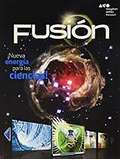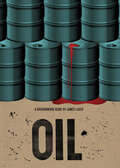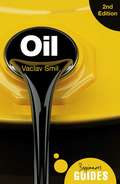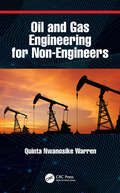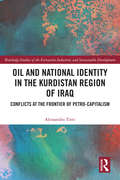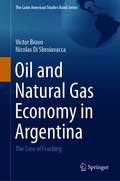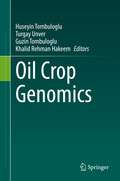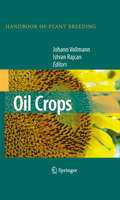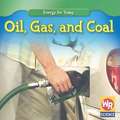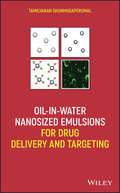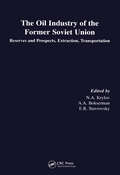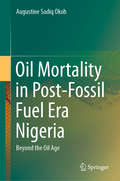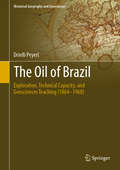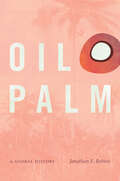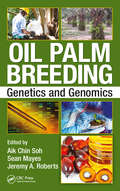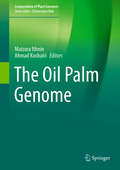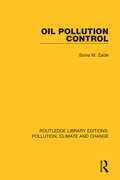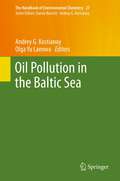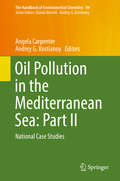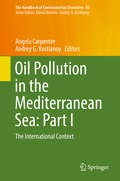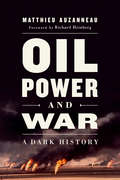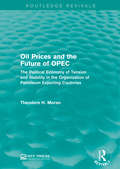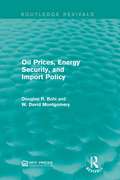- Table View
- List View
Ohio Science Fusion
by Holt McdougalCompiled for Ohio New Learning Standards for Science for Grade 7 to build science literacy to enrich your life both in school and later in life.
Ohio Science Fusion [Grade 8]
by Michael A. Dispezio Marjorie Frank Michael R. HeithausNIMAC-sourced textbook
Oil: A Groundwork Guide (Groundwork Guides)
by James LaxerThis book explores today’s global dependency on oil and reveals the sobering realities of the relationship between oil, politics and money. An excellent introduction for young adults.Oil, our main source of energy, underlies the world's economy. In the twentieth century its availability and relatively low price allowed for the industrial growth and development of the world's leading economies. The new rapidly developing giants, India and China, want access to the same possibilities. But today we know that cheap, easily accessible oil supplies are dwindling, and we are beginning to recognize the true cost to the world's environment of our profligate use of this form of energy.As Oil shows, a substantial portion of the world's remaining supply lies in countries whose interests are not identical with those of the major industrial powers."[The Groundwork Guides] are excellent books, mandatory for school libraries and the increasing body of young people prepared to take ownership of the situations and problems previous generations have left them." -- Globe and Mail
Oil: A Beginner's Guide (Beginner's Guides)
by Vaclav SmilWorld acclaimed scientist Vaclav Smil reveals everything there is to know about nature's most sought-after resourceOil is the lifeblood of the modern world. Without it, there would be no planes, no plastic, no exotic produce, and a global political landscape few would recognise. Humanity&’s dependence upon oil looks set to continue for decades to come, but what is it? Fully updated and packed with fascinating facts to fuel dinner party debate, Professor Vaclav Smil's Oil: A Beginner's Guide explains all matters related to the &‘black stuff&’, from its discovery in the earth right through to the controversy that surrounds it today.
Oil and Gas Engineering for Non-Engineers
by Quinta Nwanosike WarrenOil and Gas Engineering for Non-Engineers explains in non-technical terms how oil and gas exploration and production are carried out in the upstream oil and gas industry. The aim is to help readers with no prior knowledge of the oil and gas industry obtain a working understanding of the field. Focuses on just the basics of what the layperson needs to know to understand the industry Uses non-technical terms, simple explanations, and illustrations to describe the inner workings of the field Explains how oil is detected underground, how well locations are determined, how drilling is done, and how wells are monitored during production Describes how and why oil and gas are separated from impurities before being sent to customers Aimed at non-engineers working within the oil and gas sector, this book helps readers get comfortable with the workings of this advanced field without the need for an advanced degree in the subject.
Oil and National Identity in the Kurdistan Region of Iraq: Conflicts at the Frontier of Petro-Capitalism (Routledge Studies of the Extractive Industries and Sustainable Development)
by Alessandro TintiExamining the interplay between the oil economy and identity politics using the Kurdistan Region of Iraq as a case study, this book tells the untold story of how extractivism in the Kurdish autonomous region is interwoven in a mosaic of territorial disputes, simmering ethnic tensions, dynastic rule, party allegiances, crony patronage, and divergent visions about nature. Since the ousting of Saddam Hussein, the de-facto borders of the Kurdistan Region of Iraq have repeatedly changed, with energy interests playing a major role in such processes of territorialisation. However, relatively little research exists on the topic. This book provides a timely, empirical analysis of the intersections between extractive industries, oil imaginaries, and identity formation in one of the most coveted energy frontiers worldwide. It shines a light on relations between the global production networks of petro-capitalism and extractive localities. Besides the strained federal relationship with the Iraqi central government, the transformative effects the petroleum industry has had on Kurdish society are also explored in depth. Moreover, the book fills a gap in the literature on Kurdish Studies, which has devoted scant attention to energy-related issues in the re-imagination of Kurdish self-determination. This book will be of great interest to students and scholars of the extractive industries, energy studies, conflict studies, Middle Eastern politics, and political ecology.
Oil and Natural Gas Economy in Argentina: The case of Fracking (The Latin American Studies Book Series)
by Victor Bravo Nicolas Di SbroiavaccaThis book gathers four papers authored by Víctor Bravo and Nicolás Di Sbroiavacca, Oil and Natural Gas Engineers, specialized in Energy Economics. The main axis of the book is the application of the exploitation techniques of Oil and Natural Gas in Argentina, by the so-called “conventional” methods, in comparison with the so-called “Fracking”,(name massively used in the First World and particularly in the United States of America). Argentina has important Oil and Natural Gas resources in different regions of its wide geography. To develop these “non-conventional” techniques has generated endless controversies all over the world, mostly due to its estimated environmental impact and the need of significant requirement of large capitals for investment.Argentina is not out of this relevant controversy because in the mind of the maximum national authorities, fracking is one of the main factors that may contribute to generate monetary funds devoted to the payment of the immense foreign debt of this country. Other authors estimate that it is not possible to develop our country just on the basis of the massive exploitation and boundless export of natural resources. Consequently, fracking is undoubtedly a topic of National Energy Politics.In this scenario, a previous analysis of the National Energy Politics of the recent governments of Argentina, after the bloody military dictatorship of 1976-1983 and the return to democratic governments in December 1983. This analysis is done over the chapters “Analysis of the National Law Nº 27007 (known as the “Hydrocarbon Resources Law”) and the Oil and Natural Gas politics”, the “Oil and Natural Gas Politics of the period from 2003 to 2014” and “The Argentine Energy Politics during the 2014-2018 period”. Later on, the “Fracking” case is fully developed with two complementary analyses. One of them is basically centered on the technical and prospective scenarios for “fracking”: ”Shale Oil and Shale Gas in Argentina: Situation and Perspectives”. The other one, ”A technical opinion about Fracking”, contemplates the impacts resulting from the use of these techniques, especially those concerning the environment. Anyhow, each of the chapters are self-contained, thus permitting separate reading of any of them.
Oil Crop Genomics
by Huseyin Tombuloglu Turgay Unver Guzin Tombuloglu Khalid Rehman HakeemPlants are an important source of fats and oils, which are essential for the human diet. In recent years, genomics of oil biosynthesis in plants have attracted great interest, especially in high oil-bearing plants, such as sesame, olive, sunflower, and palm. Considering that, genome sequencing projects of these plants have been undertaken with the help of advanced genomics tools such as next generation sequencing. Several genome sequencing projects of oil crops are in progress and many others are en route. In addition to genome information, advanced genomics approaches are discussed such as transcriptomics, genomics-assisted breeding, genome-wide association study (GWAS), genotyping by sequencing (GBS), and CRISPR. These have all improved our understanding of the oil biosynthesis mechanism and breeding strategies for oil production.There is, however, no book that covers the genomes and genomics of oil crops. For this reason, in this volume we collected the most recent knowledge of oil crop genomics for researchers who study oil crop genomes, genomics, biotechnology, pharmacology, and medicine. This book covers all genome-sequenced oil crops as well as the plants producing important oil metabolites. Throughout this book, the latest genomics developments and discoveries are highlighted as well as open problems and future challenges in oil crop genomics. In doing so, we have covered the state-of-the-art of developments and trends of oil crop genomics.
Oil Crops
by Johann Vollmann Istvan RajcanThe volume on oil crop breeding is the third volume in the series, Handbook of Plant Breeding after the initial volumes on Vegetables and Cereals. Like the other volumes in the series, the volume will present information on the latest in applied plant breeding using the current advances in the field. The book consists of a total number of 19 chapters, with 17 being devoted to individual crops and two chapters dealing with general aspects of oil crop breeding. Outstanding scientists for each crop species are proposed as senior authors, who may invite co-authors to contribute part of a chapter. In order to increase the overall acceptance of the volume, authors from different research groups/countries have been asked to collaborate (if possible) on one and the same chapter in particular crops. The book is comprised primarily of specific issues and techniques pertaining to individual crops. It provides an update of the new oilseed crop development covering mainly Limnanthes ssp. and Cuphea ssp., which represent newly domesticated oil crop species with unique crop or oil characteristics. The last two chapters in the book are designed as introductory or review chapters; they highlight topics of general interest in oil crop breeding such as domestication/genetic diversity, oil crop breeding targets, oil crop and human health issues, selection strategies with biotechnologies and analytical techniques as well as genetic engineering of fatty acid profiles. This book is of interest to researchers in both academic and industrial setting as well as students and teachers of plant breeding.
Oil, Gas, and Coal
by Tea BenduhnOur lives would be very different without oil, gas, and coal. These fossil fuels help heat our homes, turn on our lights, and power our cars and trucks. But they also damage our environment-and they won't last forever. Learn how we use these energy sources today and find out how we might use them with cleaner sources of energy in the future.
Oil-in-Water Nanosized Emulsions for Drug Delivery and Targeting
by Tamilvanan ShunmugaperumalThis book combines emulsion knowledge into a single, comprehensive volume, ideal for professionals and students involved in the areas of pharmaceutical science who are looking to learn about this emergent research concept. Compiles the step-by-step investigations made concerning the potential of nanosized emulsions on both drug delivery and drug targeting areas by different group of scientists in various laboratories across the world Inverts the common nano-emulsions coverage trend of focusing on focused on the particulate system itself, instead exploring the way to turn nanosized emulsions as biomedical tool, as well as, treating the in vitro and in vivo aspects after administration Provides an overview of the current state-of-the art regarding the development of tocol emulsions, emulsion adjuvants in immunization research, oxygen-carrying emulsions (called as fluorocarbon emulsion) and emulsions for delivering drugs to nasal and topical (ocular and transdermal) routes
Oil Industry of the Former Soviet Union - Reserves, Extraction and Transportation: Reserves, Extraction and Transportation
by N Krylov A. Boksernan E StavrovskyThe Russian Federation is a leading oil producer and has a major oil supply system. This book describes the current Russian situation and prospects for the future development of its industry. Accurate data on the Russian system of oil pipelines are published here in English for the first time and will be useful to those interested or involved in the oil business. The book provides information on technologies used, including their technical and economic characteristics and current research. Part I discusses oil reserves and current resource base, prospects for their development, potential oil reserves, and those already explored. Part II discusses conditions under which oil is produced and describes features particular to Russian oil production, associated problems and technologies, including their engineering and economic aspects. Part III highlights the background, current state, and operational problems of the oil transportation system of the Federation and other countries of the former Soviet Union - one of the world's largest energy systems. Also reviewed are the technical state and operational reliability of the main pipeline network, including a general description of the pipeline system, design and construction of oil pipelines, repair and maintenance, and economic and control problems.
Oil Mortality in Post-Fossil Fuel Era Nigeria: Beyond the Oil Age
by Augustine Sadiq OkohThis book provides an insight into the complexities of weaning Nigeria from its fossil fuels addiction while growing the economy on low carbon trajectory. Nigeria faces a carbon catch 22 with the proliferation of renewable energy alternatives and scale-up of electric vehicles. The dilemma Nigeria is confronted with is to grow its fossil-led economy or face the challenge of its fossil infrastructure becoming stranded assets. It is a roadmap for plotting an environmentally benign path out of the country’s economic, social and environmental crises. This book is, therefore, a valuable resource for students, Civil Society Organizations, policymakers, academics and climate change adaptation practitioners who are interested in finding an environmentally sensitive path out of Nigeria’s economic cul-de-sac fostered by the decarbonization of the global energy economy. Findings of this study will trigger a national conversation on the looming exit from fossil fuels. In doing so, accelerate the integration of renewable energy into the Nigerian national development plan while building a carbon neutral society. Lessons learnt from the handling of Nigeria’s precarious circumstance will be of immense benefit to other oil prospecting, oil producing and non-producing nations who are interested in finding an equitable way of pursuing two inversely related goals of meeting their decarbonization commitments while simultaneously growing their economies in the post-Paris era.
The Oil of Brazil: Exploration, Technical Capacity, and Geosciences Teaching (1864-1968) (Historical Geography and Geosciences)
by Drielli PeyerlThis book investigates the role of the National Petroleum Council (CNP) and especially of Petrobras in the construction and shaping of courses in Geosciences, as part of the historical process of the search for and exploration of oil, which began in Brazil in 1864 and ended in 1968 with the discovery of the first offshore well.The book explores the history of the discovery of oil in Brazil together with the historical development of oil research and geosciences in Brazil. It also elucidates significant events and developments which occurred between 1864 and 1968 such as the foundation of the Ouro Preto Mining School, the foundation of the CNP and Petrobras and other scientific societies and universities and their contributions to the formation and constitution of geosciences in Brazil. This book also discusses the massive investments by CNP and Petrobras in technical and scientific research for oil exploration in the Brazilian territory.This unique book appeals to scientists, students and professionals in geosciences, history and related fields.
Oil Palm: A Global History (Flows, Migrations, and Exchanges)
by Jonathan E. RobinsOil palms are ubiquitous—grown in nearly every tropical country, they supply the world with more edible fat than any other plant and play a role in scores of packaged products, from lipstick and soap to margarine and cookies. And as Jonathan E. Robins shows, sweeping social transformations carried the plant around the planet. First brought to the global stage in the holds of slave ships, palm oil became a quintessential commodity in the Industrial Revolution. Imperialists hungry for cheap fat subjugated Africa's oil palm landscapes and the people who worked them. In the twentieth century, the World Bank promulgated oil palm agriculture as a panacea to rural development in Southeast Asia and across the tropics. As plantation companies tore into rainforests, evicting farmers in the name of progress, the oil palm continued its rise to dominance, sparking new controversies over trade, land and labor rights, human health, and the environment. By telling the story of the oil palm across multiple centuries and continents, Robins demonstrates how the fruits of an African palm tree became a key commodity in the story of global capitalism, beginning in the eras of slavery and imperialism, persisting through decolonization, and stretching to the present day.
Oil Palm Breeding: Genetics and Genomics
by Aik Chin Soh, Sean Mayes, and Jeremy RobertsThe oil palm is a remarkable crop, producing around 40% of the world’s vegetable oil from around 6% of the land devoted to oil crops. Conventional breeding has clearly been the major focus of genetic improvement in this crop. A mix of improved agronomy and management, coupled with breeding selection have quadrupled the oil yield of the crop since breeding began in earnest in the 1920s. However, as for all perennial crops with long breeding cycles, oil palm faces immense challenges in the coming years with increased pressure from population growth, climate change and the need to develop environmentally sustainable oil palm plantations. In Oil Palm: Breeding, Genetics and Genomics, world leading organizations and individuals who have been at the forefront of developments in this crop, provide their insights and experiences of oil palm research, while examining the different challenges that face the future of the oil palm. The editors have all been involved in research and breeding of oil palm for many years and use their knowledge of the crop and their disciplinary expertise to provide context and to introduce the different research topics covered.
The Oil Palm Genome (Compendium of Plant Genomes)
by Maizura Ithnin Ahmad KushairiThis book compiles the fundamental advances resulting from of oil-palm genome and transcriptome sequencing, and describes the challenges faced and strategies applied in sequencing, assembling and annotating oil palm genome sequences. The availability of genome and transcriptome data has made the mining of a high number of new molecular markers useful for genetic diversity as well as marker-trait association studies and the book presents high-throughput genotyping platforms, which allow the detection of QTL regions associated with interesting oil palm traits such as oil unsaturation and yield components using classical genetic and association mapping approaches. Lastly, it also presents the discovery of major genes governing economically important traits of the oil palm.Covering the history of oil palm expansion, classical and molecular cytogenetics, improvements based on wild and advanced genetic materials, and the science of oil palm breeding, the book is a valuable resource for scientists involved in plant genetic research.
Oil Pollution Control
by Sonia M. ZaideOil pollution has been a major environmental concern since the 1920s. The search for a solution has ranged from prevention to partial measures coupled with compensation and remedial action. This book, originally published in 1987, offers a different assessment of the efforts of governments and the oil and maritime industries. It was also the first book to provide a comprehensive story of control policies and practices, using primary and secondary sources. The book identified numerous factor – personalities, state policies, developments in the oil and shipping industries, public agitation and scientific studies in a framework useful for analysing any environmental problem.
Oil Pollution in the Baltic Sea
by Andrey G. Kostianoy Olga Yu LavrovaThis thorough review is based on observational satellite, airborne and in-situ data, scientific literature and technical reports, as well as the substantial experience of the authors, who hail from several Baltic Sea countries. They pay special attention to national practices, HELCOM and EMSA CleanSeaNet activities in oil pollution monitoring, and show different applications of the Seatrack Web model for oil spill drift prediction and the identification of illegal polluters, as well as for environmental risk assessment. Furthermore, some of the results on satellite monitoring of the Nord Stream gas pipeline construction in the Gulf of Finland are presented. This volume addresses the needs of specialists working in different fields of marine, environmental, and remote sensing sciences. It is a useful handbook on oil pollution for international and governmental agencies, as well as for policy makers who plan and manage oil and gas projects, the construction of ports and terminals, shipping, fishery, recreation, and tourist activities in the Baltic Sea. It also offers graduate and undergraduate students in marine and environmental sciences a valuable resource and reference work on the subject.
Oil Pollution in the Mediterranean Sea: National Case Studies (The Handbook of Environmental Chemistry #84)
by Angela Carpenter Andrey G. KostianoyThis volume reviews the oil inputs to the Mediterranean Sea from sources such as shipping, offshore oil installations, and oil refineries, presented in a number of national case studies. A regional overview is also presented for the Adriatic Sea. Topics include mapping of oil slicks in the Adriatic, oil exploration and exploitation activities in the waters of the Levantine Basin (Eastern Mediterranean), the oil pollution preparedness and response activities of individual Mediterranean states, bilateral and regional cooperation among the various states, and the risk of pollution from shipping in sensitive sea areas, for example. Together with the companion volume Oil Pollution in the Mediterranean Sea: Part I - The International Context, it addresses both national and international measures in the region, making it of relevance to the agencies and government bodies tasked with remediating or preventing oil pollution, as well as policymakers and practitioners in the fields of shipping, ports and terminals, oil extraction and marine management. It provides researchers with essential reference material on tools and techniques for monitoring oil pollution, and constitutes a valuable resource for undergraduate and post-graduate students in the field of marine oil pollution.
Oil Pollution in the Mediterranean Sea: The International Context (The Handbook of Environmental Chemistry #83)
by Angela Carpenter Andrey G. KostianoyThis volume offers a review of oil inputs to the Mediterranean Sea from sources such as shipping, and offshore exploration and exploitation activities. It discusses international measures to prepare for, respond to, and prevent oil pollution incidents, as well as the international legal framework and agencies with a role in pollution prevention and responses. It includes chapters on modeling the fate of oil pollution, oil spill response, and oil spill beaching probability, and presents data from a range of sources, including historic data on shipping accidents and oil exploration and exploitation activities, satellite and remote sensing data, and numerical modelling data, to provide an overview of oil pollution over several years. Topics covered include modelling of oil slicks in the eastern and western Mediterranean basins, oil exploration and exploitation activities in the waters of the Levantine Basin (Eastern Mediterranean), and signatures to and ratification of the Barcelona Convention and its Protocols, for example. Together with the companion volume Oil Pollution in the Mediterranean Sea: Part II - National Case Studies, it addresses both national and international measures in the region, making it of relevance to the agencies and government bodies tasked with remediating or preventing oil pollution, as well as policymakers and practitioners in the fields of shipping, ports and terminals, oil extraction and marine management. It provides researchers with essential reference material on tools and techniques for monitoring oil pollution, and serves as a valuable resource for undergraduate and postgraduate students in the field of marine oil pollution.
Oil, Power, and War: A Dark History
by Matthieu AuzanneauIn this sweeping, unabashed history of oil, Matthieu Auzanneau takes a fresh, thought-provoking look at the way oil interests have commandeered politics and economies, changed cultures, disrupted power balances across the globe, and spawned wars. He upends commonly held assumptions about key political and financial events of the past 150 years, and he sheds light on what our oil-constrained and eventually post-oil future might look like. Oil, Power, and War follows the oil industry from its heyday when the first oil wells were drilled to the quest for new sources as old ones dried up. It traces the rise of the Seven Sisters and other oil cartels and exposes oil’s key role in the crises that have shaped our times: two world wars, the Cold War, the Great Depression, Bretton Woods, the 2008 financial crash, oil shocks, wars in the Middle East, the race for Africa’s oil riches, and more. And it defines the oil-born trends shaping our current moment, such as the jockeying for access to Russia’s vast oil resources, the search for extreme substitutes for declining conventional oil, the rise of terrorism, and the changing nature of economic growth. We meet a long line of characters from John D. Rockefeller to Dick Cheney and Rex Tillerson, and hear lesser-known stories like how New York City taxes were once funneled directly to banks run by oil barons. We see how oil and power, once they became inextricably linked, drove actions of major figures like Churchill, Roosevelt, Stalin, Hitler, Kissinger, and the Bushes. We also learn the fascinating backstory sparked by lesser-known but key personalities such as Calouste Gulbenkian, Abdullah al-Tariki, and Marion King Hubbert, the once-silenced oil industry expert who warned his colleagues that oil production was facing its peak. Oil, Power, and War is a story of the dreams and hubris that spawned an era of economic chaos, climate change, war, and terrorism—as well as an eloquent framing from which to consider our options as our primary source of power, in many ways irreplacable, grows ever more constrained. The book has been translated from the highly acclaimed French title, Or Noir.
Oil Prices and the Future of OPEC: The Political Economy of Tension and Stability in the Organization of Petroleum Exporting Coutnries (Routledge Revivals)
by Theodore H. MoranThe policy of the United States and, by extension, that of many oil importing countries, toward OPEC countries is in large part a function of an estimate of the factors that condition oil decisions in exporting countries. In this title, originally published in 1978, Ted Moran examines how immune OPEC can expect to be to the struggles over market shares that traditionally have beset attempts to organize natural resource cartels. Moran’s research leads him to argue that skyrocketing commitments to growth and social betterment leave little slack in national budgets and thus preclude output reductions for any extended period, or at least act as a substantial deterrent, unless such reductions come in support of an effort to raise real oil prices substantially. For any student interested in international policy making, economic development, or environmental studies, this title offers fascinating insights into the oil industry.
Oil Prices, Energy Security, and Import Policy (Routledge Revivals)
by Douglas R. Bohi W. David MontgomeryThis book, first published in 1982, takes the interaction between the domestic economy and the international trade in oil and, through the use of a consistent microeconomic framework, examines the conditions under which energy and related policies may or may not improve the performance of the U.S. economy, during both normal periods and old supply disruptions. This title will be of interests to students of environmental management.


